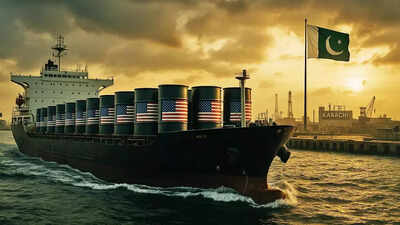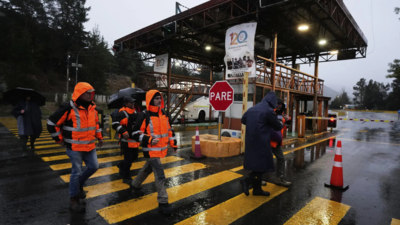Pakistan and Iran agreed on Sunday to increase bilateral trade to USD 8 billion annually, taking advantage of their geography and the “discount of distance,” as trade ministers from the two countries held discussions to deepen economic and political ties. The agreement was reached during a meeting between Commerce Minister Jam Kamal Khan and Iranian Minister for Industry, Mines and Trade Mohammad Atabak on the sidelines of Iranian President Masoud Pezeshkian’s two-day state visit to Pakistan.
Pezeshkian landed in Lahore on Saturday afternoon and then flew to the capital in the evening. A statement by the Commerce Ministry here said the high-level discussion between Khan and Atabak marked a renewed commitment from both sides to accelerate trade, remove border bottlenecks, and build trust-based partnerships across priority sectors. “[During the meeting], Kamal envisioned that, if fully leveraged, bilateral trade between Pakistan and Iran could easily exceed USD 5-8 billion annually in the coming years,” the ministry said. Before departing from Tehran, Pezeshkian had said Iran and Pakistan have always maintained “good, sincere, and deep relations” and plan to increase bilateral trade volume to USD 10 billion annually. During Sunday’s meeting, emphasis was placed on maximising the potential of neighbourhood trade, with Khan highlighting how ASEAN countries have benefited enormously by trading within their region. “Geography is an advantage. Pakistan and Iran must utilise this discount of distance. If we don’t, we lose both time and cost benefits,” he stated. The Pakistani minister suggested organising targeted trade delegations that include representatives from federal and provincial chambers of commerce, enabling focused discussions on market access and regulatory facilitation, according to the statement. “We’ve done this model successfully in Belarus and elsewhere,” he was quoted in the statement as saying. “Let’s do the same for Iran, starting with sectors that show the greatest potential for mutual benefit.” The ministers also expressed a shared commitment to increasing the use of existing trade corridors and border facilities. Atabak also highlighted ongoing discussions about increasing Pakistani exports to Iran and encouraged swift follow-up on newly signed agreements. “Traders and industrialists in both countries are ready. They trust each other. What they need now is a clear and consistent facilitation mechanism from our side,” he noted. Khan said that beyond bilateral gains, such connectivity could expand to Turkey, Central Asia, Russia, and even parts of West Asia, creating an economic bloc of substantial power and resilience. Atabak supported the idea of holding a dedicated B2B day during every high-level visit and offered to bring Iranian business groups to Pakistan for in-depth meetings, the statement said. Both ministers agreed on the importance of identifying specific sectors such as agriculture, livestock, services, energy, and cross-border logistics for future collaboration, the statement said. “With high-level political alignment and mutual trust, Pakistan and Iran appear poised to enter a new phase of strategic economic partnership that could reshape regional trade dynamics,” it added.






